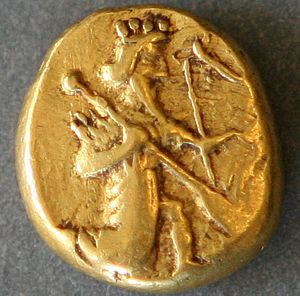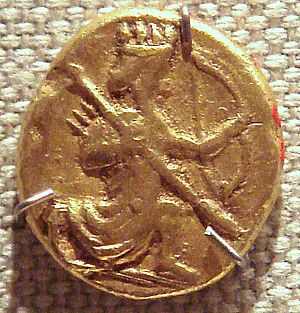Daric facts for kids
The daric was a special gold coin used in the ancient Achaemenid Empire. This empire was a huge and powerful kingdom in Persia (modern-day Iran). The daric, along with a silver coin called the siglos, helped set the money system for the empire.
Contents
How the Daric Started
Cyrus the Great was a famous king who ruled the Persian Empire from 550 to 530 BC. After he conquered the kingdom of Lydia in 546 BC, he started using coins in his empire. Lydia's king, Croesus, was actually the first to create coins in history! At first, Cyrus used the same lion-and-bull coins that Lydia had.
Later, Darius I, who ruled from 521 to 486 BC, introduced the new gold daric. This coin was thick and weighed about 8.4 grams. One gold daric was worth 20 silver coins. The gold in these coins was very pure, almost 96% gold!
What the Daric Looked Like
The daric coins usually showed an image of the Persian king. Sometimes, it showed a great warrior holding a bow and an arrow. This image was a strong symbol of the king's power.
The use of darics ended around 330 BC. This was when Alexander the Great invaded the Persian Empire. Most of the daric coins were then melted down and turned into Alexander's own coins.
Who Could Make Coins?
Near the end of the 5th century BC, some Persian governors, called satraps, in Asia Minor started making their own coins. King Darius thought this was a serious crime. He believed that only the king had the right to make coins. The pictures on the darics always showed the king, showing his royal power.
The Daric in Ancient Stories
The daric coin is mentioned a couple of times in the Hebrew Bible. It's called "adarkonim" there. This happened because the Israelites met the daric when the Persians conquered their Babylonian rulers.
For example, the First Book of Chronicles tells a story about King David. He asked his people to donate money to build a temple. The people gave a lot, including "ten thousand darics of gold." However, King David lived much earlier (around 1000 BC) than when darics were first made. So, this mention might be the writer using a coin name that people knew at the time.
The daric is also mentioned in the Book of Ezra and the Book of Nehemiah.
There's a famous story about a Spartan king named Agesilaus II. He was fighting a successful war in Asia Minor. But then, a Persian governor gave money (darics) to start a war in Greece. Agesilaus had to go back home. He joked that he was driven out of Asia by "ten thousand archers." He was talking about the image of the archer on the daric coins!
Where Did the Name "Daric" Come From?
The ancient Greeks called the coin dareikós. They believed this name came from Darius the Great, who they thought created these coins. Some experts agree with this idea.
However, other experts think the Greek name might come from an Old Persian word meaning "golden." They believe it was only later that people connected the coin's name to King Darius.
Images for kids
-
Daric Type IV ("King running with dagger"), from the time of Artaxerxes II to Artaxerxes III, around 375-340 BC.
-
A Double Daric coin made in Babylon around 322-315 BC, after Alexander the Great's conquests.
See also
- Achaemenid currency
 | Precious Adams |
 | Lauren Anderson |
 | Janet Collins |







